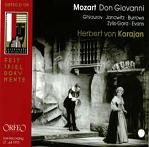This is a wonderful surprise. As one who found Karajan’s 1986 recording (DG) of this opera bloated and over-examined (though well sung and played), the prospect of another weirdly paced, mannered, and heavy performance, albeit with some of the great stars of the period, was not pleasant. Even with some applause included (this was recorded live in Salzburg in 1970), the present recording comes in at 10 minutes faster than the ’86–a good sign. Karajan still indulges in strange tempos, and they’re evident from the overture: the doom-laden opening moments are very slow, but once the allegro begins it’s like a whirlwind. This concept is carried throughout the opera.
The dark moments can be very deliberate and Karajan underlines the tragedy: Anna’s “Crudele…Non mi dir” takes eight minutes to get through–certainly a world record for pokiness, while the Masker’s Trio and Elvira’s “Mi tradi” are similarly slow. By contrast, the first-act finale is breakneck–impeccably controlled and articulated–and so is the Don’s “Fin ch’han del vino”. Somehow, when the singers can cope with all of this, which is most of the time, it works.
Karajan’s singers are remarkably varied in timbre. There would be no way of confusing Nicolai Ghiaurov’s Don with Geraint Evans’ Leporello (or Victor von Halem’s Commendatore, for that matter), as is so often the case in recordings. This might be Ghiaurov’s best recorded performance; I’ve certainly never heard him better. His huge bass rolls out like dark chocolate, caressing the Serenade, not missing a note or word in “Fin ch’han del vino”, sneering arrogantly, defiant. His is not a gentle Don; it’s a tyrant–manly and egocentric.
Evans’ spicy bass-baritone is ideal for his portrait of the bumpkin-like, irresponsible Leporello, and he also is in fine voice. Von Halem’s Commendatore is imperious and deadly serious and Rolando Panerai gives us a Masetto who figures it all out but is powerless and frustrated. Stuart Burrows’ Don Ottavio is simply gorgeous. He’s almost always called upon to sing very slowly (the nobles take their time here) and he has the long breath for both of his arias, which he sings about as beautifully as we can hope for. Furthermore, not a line of recitative is allowed to go by without meaning; for once Ottavio is a real person.
Teresa Zylis-Gara’s warm tone is right for this view of Elvira: She’s not a harridan but rather is a sad victim who would take the Don back in a minute. Karajan does not play Elvira for humor. Anna is sung by Gundula Janowitz, whose silvery tone is simply ravishing in this music. Like Burrows she can carry the slow tempos Karajan chooses, and her high, pianissimo singing is ravishing. She gets caught in the fast coloratura at the end of her last aria, but so does almost every soprano. Olivera Miljakovic is a light, unmemorable Zerlina, outclassed by her peers. The Vienna Philharmonic plays stunningly and the sonics are amazingly good. Purists may want to stick with Giulini (EMI) or (purists of another kind) with Gardiner (Archiv), but once Karajan’s seemingly odd choices become clear, great joy can be had from this set. And simply as singing (try the Masker’s Trio), there are desert-island moments here.
































